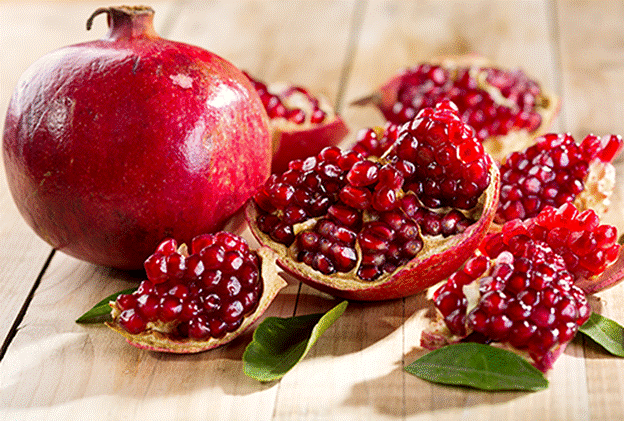Pomegranates are considered one of the healthiest fruits. They contain a wide range of beneficial plant compounds that are unmatched by many other foods. Studies have shown that they can benefit the body and reduce the risk of various diseases. Here are 12 evidence-based health benefits of pomegranates.
1. Pomegranates are packed with important nutrients.
The pomegranate, also known as Punica granatum, is a shrub that produces red fruit. Classified as a berry, the pomegranate is about 5 to 12cm in diameter. The fruit is red, round and looks like a red apple with a flower-shaped end.
The skin of the pomegranate is thick and inedible, but inside there are hundreds of edible seeds. Each seed is surrounded by a red, sweet and juicy layer called the aril.
The seeds are the edible part of the pomegranate, which you can eat raw or make into pomegranate juice – but the skin is usually discarded.
Pomegranates are nutritionally valuable – one cup of the peel (174 grams) contains:
- Fiber: 7 grams
- Protein: 3 grams
- Vitamin C: 30% of the RDI
- Vitamin K: 36% of the RDI
- Folate: 16% of the RDI
- Potassium: 12% of the RDI
The peel of the pomegranate is very sweet, with one cup containing 24 grams of sugar and 144 calories. However, the high value of pomegranates is not only due to the peel but also due to the plant compounds, some of which have powerful medicinal properties.

Pomegranates provide many health benefits
2. Pomegranates Contain Two Plant Compounds With Powerful Medicinal Properties
Pomegranates contain two unique compounds that have beneficial effects on the body.
2.1. Punicalagins
Punicalagin is an extremely powerful antioxidant found in pomegranate juice and seed coat. This compound is so powerful that pomegranate juice has been found to have three times the antioxidant activity of red wine and green tea. Pomegranate extract and powder are often made from the seed coat, due to its high antioxidant and Punicalagin content.
2.2. Punicic Acid
Punicic acid is found in pomegranate seed oil and is the main fatty acid component of the seed coat. It is a conjugated linoleic acid with powerful biological effects.
3. Pomegranates Have Powerful Anti-Inflammatory Effects
Chronic inflammation is a risk factor for many serious diseases, including heart disease, cancer, type 2 diabetes, Alzheimer’s disease, and obesity.
Pomegranates have powerful anti-inflammatory properties, largely mediated by the antioxidant properties of punicalagins. Test-tube studies have shown that they can reduce inflammation in the digestive tract, as well as in breast and colon cancer cells. A 12-week study in people with diabetes found that 250ml) of pomegranate juice per day reduced CRP (an inflammatory marker) and interleukin-6 by 32% and 30%, respectively.
If you’re interested in reducing inflammation in your body, pomegranates are a great addition to your diet.
4. Pomegranate May Help Fight Prostate Cancer
Prostate cancer is a common cancer in men. Laboratory studies have shown that compounds extracted from pomegranates can slow cancer cell division and even induce apoptosis, or programmed cell death, in cancer cells.
Prostate-specific antigen (PSA) is a blood marker for prostate cancer. Men whose PSA levels double over a short period of time are at increased risk of dying from prostate cancer.
One study in humans found that drinking 8 ounces of pomegranate juice daily extended the time it took for PSA to double from 15 months to 54 months. A follow-up study found similar effects using a pomegranate extract called POMx.
5. Pomegranate May Also Be Helpful Against Breast Cancer
Breast cancer is one of the most common cancers in women. Pomegranate extract may inhibit the reproduction of breast cancer cells, and may even kill some cancer cells.
However, the current evidence is based only on laboratory studies. More research is needed before any conclusions can be drawn.
6. Pomegranates May Lower Blood Pressure
High blood pressure (hypertension) is a risk factor for heart attacks and strokes. In one study, people with high blood pressure had significant reductions in blood pressure after consuming 150ml of pomegranate juice every day for two weeks. Other studies have found similar effects, especially on systolic blood pressure, which is the top number in a blood pressure reading.
7. Pomegranates May Help Fight Arthritis and Joint Pain
Arthritis is a common problem in both developed and developing countries. There are many different types of arthritis, but most involve some form of inflammation in the joints. The plant compounds in pomegranates have anti-inflammatory effects, which makes sense given that they may help treat arthritis.
Laboratory studies have shown that pomegranate extract may block enzymes known to damage joints in people with osteoarthritis.
The extract has also been shown to reduce arthritis in mice, but evidence from human studies is very limited to date.

Pomegranate helps improve symptoms of arthritis
8. Pomegranate Juice May Reduce Your Risk of Heart Disease
Heart disease is the leading cause of death in the world. It is a complex disease, caused by many different factors. Punicic acid, the main fatty acid in pomegranates, may help protect against several steps in the development of cardiovascular disease.
A 4-week study in 51 people with high triglyceride levels found that 800 mg of pomegranate seed oil per day significantly reduced triglycerides and improved the triglyceride-to-HDL ratio.
Another study looked at the effects of pomegranate juice in people with type 2 diabetes and high cholesterol. The study noted a significant reduction in LDL cholesterol levels, as well as other improvements.
Pomegranate juice has also been shown in both animal and human studies to protect LDL cholesterol particles from oxidation, one of the key steps in the path to cardiovascular disease.
Finally, a study analysis concluded that pomegranate juice reduces blood pressure, which is a major risk factor for cardiovascular disease.
9. Pomegranate juice may help treat erectile dysfunction
Oxidative damage can reduce blood flow in all organs of the body, including penile tissue. Pomegranate juice has been shown to increase blood flow and erectile response in rabbits.
In a study of 53 men with erectile dysfunction, pomegranate appeared to have some benefits, but they were not statistically significant.
10. Pomegranate may help fight bacterial and fungal infections
The plant compounds in pomegranates may help fight harmful microorganisms. For example, they have been shown to fight certain types of bacteria as well as the yeast Candida albicans.
The antibacterial and antifungal effects of pomegranate also help protect against infections and inflammations in the oral cavity such as gingivitis, periodontitis and denture stomatitis.
11. Pomegranate May Improve Memory
There is some evidence that pomegranates may improve memory. One study in surgical patients found that 2 grams of pomegranate extract helped prevent memory deficits after surgery.
Another study in 28 older adults with memory symptoms found that 8 ounces of pomegranate juice per day significantly improved markers of verbal and visual memory. Studies in mice have also shown that pomegranates may help fight Alzheimer’s disease.
12. Pomegranate May Improve Exercise Performance
Pomegranates are rich in nitrates, which have been shown to improve exercise performance. A study in 19 runners found that one gram of pomegranate extract 30 minutes before exercise significantly increased blood flow, reduced fatigue, increased exercise duration, and increased exercise efficiency. More research is needed, but it appears that pomegranates may benefit physical performance.
In summary, pomegranates are one of the healthiest foods, packed with nutrients and beneficial plant compounds. They have a variety of benefits and may help reduce the risk of serious diseases, including heart disease, cancer, arthritis, and other inflammatory conditions. Furthermore, eating pomegranates may improve memory performance and physical activity.





